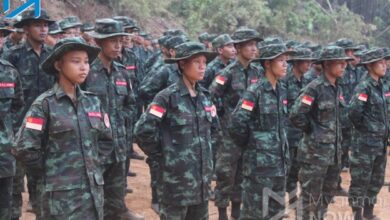
The junta-appointed Myanmar election commission chair said on Friday at a meeting in Naypyitaw that Aung San Suu Kyi’s National League for Democracy (NLD) could be disbanded due to “electoral fraud” and party leaders prosecuted as “traitors.”
Thein Soe, a former judge advocate general in the military and deputy chief justice, was appointed as the new chair of the Union Election Commission (UEC) by the military in the wake of the February 1 coup, which it staged on the pretext of alleged irregularities in last year’s election.
Thein Soe said the commission’s scrutiny of voter lists would soon be concluded. After this, the commission plans to prosecute the NLD for the alleged “fraud,” according to a recording of his speech heard and verified by Myanmar Now.
“What do we do to the NLD party that conspired by breaking the law? Should the party be disbanded? Prosecute those individuals who committed these acts as traitors to the country? We will take action accordingly,” he said at the Naypyitaw meeting.
He accused the NLD government of inflating voter lists, allowing those without identity cards to cast ballots, and using advance voting to benefit their party.
“It is an intentional move, to then be able to form a one-party government,” Thein Soe told political party representatives at the meeting.
Legal action against the NLD would take place “soon,” he added, but did not specify when.
Thein Soe also asked the representatives of parties who attended Friday’s meeting to provide evidence of electoral fraud that they may have experienced or witnessed.

Despite the accusations by the junta-led election commission, the Asian Network for Free Elections (ANFREL) has described the results of the 2020 vote as “by and large, representative of the will of the people of Myanmar” in its final report on the election released earlier this week.
Friday’s UEC event in Naypyitaw was the second such meeting of parties since the junta’s reappointment of commission members. Representatives of 59 political parties, including the People’s Party, which is led by 1988-generation pro-democracy activists, were present. Most of the parties who participated in the meeting did not win any seats in last year’s election.
The chair of the People’s Party, Ko Ko Gyi, has been a well-known political figure since the 1988 people’s uprising against the military. Many of the party’s senior leaders resigned out of opposition to the party’s decision to attend the meeting with junta-appointed UEC.
Among those parties that boycotted the meeting were the Shan Nationalities League for Democracy (SNLD), the Democratic Party for New Society (DPNS), and other prominent ethnic parties.
The chair of the DPNS said his party condemned and rejected the “illegitimate” actions of the military, including the murder of more than 800 civilians since anti-coup protests broke out throughout the country.
Rakhine politician Aye Maung who is the leader of the Arakan Front Party (AFP) was also present at the meeting. He was also a founding member of the Arakan National Party (ANP) until his resignation in 2017.
Aye Maung, who was sentenced to 20 years in prison for high treason in 2019, was released from prison as part of a general amnesty by the military junta on February 12.
He was arrested along with a Rakhine writer in January 2018 for delivering speeches marking the 233rd anniversary of the fall of the Arakan Kingdom at a rally in Rakhine State’s Rathedaung Township.

Junta welcomes back UEC’s 2010 chair
Current military-appointed UEC chair Thein Soe served as chair of the commission during the 2010 election, which was overseen by Myanmar’s military regime headed by Than Shwe.
The military-backed Union Solidarity and Development Party (USDP) “won” some 80 percent of seats in that election—the country’s first in two decades—but the vote was widely rejected both internationally and by civil society as being neither free nor fair. Thein Soe also barred foreign observers and international media from witnessing voting.
The NLD boycotted the 2010 election out of objection to the military-drafted 2008 Constitution as well as electoral laws barring those with criminal records from candidacy. Prior to that time, more than 2,000 activists, including NLD leaders, had been detained for their political activities.

Suu Kyi, who was general secretary of the NLD, was under house arrest by the military regime when the election was held on November 7, 2010. She was released one week later.
Leaders of the NLD, including its chair Suu Kyi, were again arrested and charged following the February 1 coup. She faces a total of six charges, including alleged violations of the Official Secrets Act which carry a 14-year prison sentence. Party patron Win Htein has been charged with sedition.
Former UEC members appointed by the NLD government were also detained along with many NLD politicians and other activists.
The regime has said that it will hold elections again at an unspecified time. No major pro-democracy party has made an official statement regarding whether they would take part in an election under the coup regime.


![Resistance fighters holding heavy weapons ammunition in central Myanmar. (Photo: Freedom Revolution Force [FRF])](https://myanmar-now.org/en/wp-content/uploads/sites/5/2024/04/438869056_443267851680128_1706386881626943924_n-390x220.jpeg)
